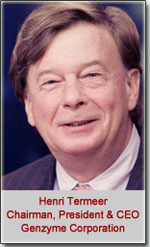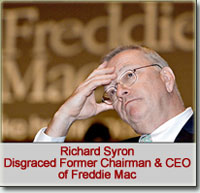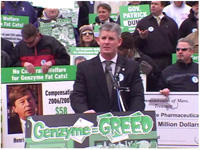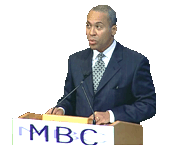Genzyme = Greed
Genzyme Corporation
500 Kendall Street
Cambridge, MA 02142
617-252-7500
www.genzyme.com
publicly traded on NASDAQ; ticker symbol: GENZ
CEO: Henri A. Termeer
Employees: 10,000
2009 revenue: $4.5 billion
2009 net income: $422 million
Executive Officers
(from company's SEC filings, website, and other sources)
Henri A. Termeer

- Chairman, President & Chief Executive
- 2009 Compensation from Genzyme: $15,605,100
- 2008 Compensation from Genzyme: $13,773,782
- 2007 Compensation from Genzyme: $35,619,019
- 2006 Compensation from Genzyme: $22,448,918
- Mr. Termeer also receives compensation from some of the sources listed below:
- Director of ABIOMED, Inc.
- Chairman of the Federal Reserve Bank of Boston.
- Director of Massachusetts General Hospital
- Board of Fellows, Harvard Medical School
- Board Member, Massachusetts Institute of Technology
- Board Member, Partners Healthcare
- Co-chair of Leadership Council, Mass. Life Sciences Collaborative.
- Director, Pharmaceutical Research and Manufacturers of America.
- Appointed to Governor Deval Patrick's Council of Economic Advisors
2009 Compensation for Genzyme's
Five Top Executives
(Source: Genzyme's 2010 proxy statement)
Executive |
Total Compensation |
Henri Termeer |
$15,605,100 |
Michael Wyzga |
$2,389,522 |
Earl Collier |
$2,618,469 |
David Meeker |
$2,322,077 |
Sanford S. Smith |
$2,660,039 |
Peter Wirth |
$11,238,818 |
It should be noted that Genzyme executive, Richard A. Moscicki, M.D., Chief Medical Officer; Senior VP-Clinical, Medical and Regulatory Affairs has also been a physician staff member at the Massachusetts General Hospital and a faculty member at the Harvard Medical School since 1979.
Board of Directors (Information from Genzyme's 2010 proxy statement and other sources)
Douglas A. Berthiaume, director since 1988
Mr. Berthiaume, 61, is Chairman, President an CEO Waters Corporation (Milford, MA), a manufacturer of high performance liquid chromatography, mass spectrometry, thermal analysis and rheology products and services. He is Chairman of the Children's Hospital (Boston) Trust Board, a member of the Children's Hospital board of trustees and a trustee of the University of Massachusetts Amherst Foundation.
Robert J. Bertolini, director since December 2009
Mr. Bertolini, 48, retired from Schering-Plough Corp. following its merger with Merck & Co. in November 2009.
Gail K. Boudreaux, director since 2004
Ms. Boudreaux, 49, is an Executive Vice President of United Health Group Incorporated and President of its United Healthcare business. She serves on the board of directors of America's Health Insurance Plans, the health insurance industry's trade association.
Robert J. Carpenter, director since 1994
Mr. Carpenter, 65, is President of Boston Medical Investors, Inc., a privately-held company. He is Chairman of Hydra Biosciences, Inc., and trustee of the Immune Disease Institute, a non-profit institute affiliated with Children's Hospital in Boston that performs research in immunology.
Charles L. Cooney, Ph.D., director since 1983
Dr. Cooney, 65, is the Robert T. Haslam (1911) Professor of Chemical and Biochemical Engineering and Faculty Director, Deshpande Center for Technological Innovation at Massachusetts Institute of Technology. Dr. Cooney is a director of Polypore International, Inc. and a director of India-based Biocon Limited, a biotechnology healthcare company. He is also a principal of BioInformation Associates, Inc.
Victor J. Dzau, M.D., director since 2000
Dr. Dzau, 64, has served as the Chancellor for Health Affairs and President and Chief Executive Officer of Duke University Health System in Durham, North Carolina since September 2004. Dr. Dzau sits on the board of directors of Pepsico, Inc., Alnylam Inc., Medtronic, Inc. and the Duke University Health System.
From Duke, in 2007, he received: salary: $797,988; benefits: $31,880; expense account: $48,702
From Private Diagnostic Clinic: salary: $190,206; benefits: $47,573
For years, Dr. Dzau has also received substantial annual compensation for sitting on the boards of Pepsico, Inc.; Alnylam Pharmaceuticals, Inc. and Medtronic, Inc. For example, in 2008, he received $296,892 from Pepsico, Inc. In 2009, he received $234,443 from Alnylam Pharmaceuticals, Inc., and he also received $207,448 from Medtronic, Inc. in 2009.

Senator Connie Mack III, director since 2001
Senator Mack, 69, has served since January 2010 as a government relations consulting partner at Liberty Partners in Washington D.C. From February 2005 through December 2009 he served as Senior Policy Advisor and Co-Chairman of the government relations practice group at King & Spalding LLP, a Washington D.C. law firm. He is also a director of Mutual of America Life Insurance Co., Darden Restaurants, EXACT Sciences Corporation and Moody's Corp.
It should be noted that King & Spalding's web site describes their "Traditional Labor Practice":
"...We counsel non-union clients on how to remain union free, and we represent clients in union organizing campaigns and unfair labor practice cases. We have also advised clients with respect to decertifying incumbent labor unions, and have had a number of successful decertifications. We often represent clients in collective bargaining, advise clients on contract interpretation issues, and represent clients in arbitration proceedings pursuant to their collective bargaining agreements. We also actively work with clients facing work stoppages, including training management employees, obtaining injunctive relief where appropriate, and advising clients on replacement of striking workers..."
Under "Preventive Advice and Training" King & Spalding states: "We also conduct training for all levels of employees from executives to staff. These training sessions include: The Manager's and Supervisor's role in Maintaining Union Free Status..."
Some of the clients that King & Spalding have represented include Brown & Williamson Tobacco Corp., The Coca-Cola Co., Chevron, Dow Chemical, ExxonMobil Corp, General Electric Capital Corp., General Electric Co., General Motors Corp., GlaxoSmithKline, Lockheed Martin Corp, SunTrust Banks, Inc. and Turner Broadcasting System.
Every year, Mr. Mack, along with the exorbitant compensation he receives for being on the board of Genzyme, rakes in multiple payments for serving on the boards of a number of other corporations. For example, his annual compensation for serving on these boards looks like this: in 2009, Darden Restaurants — $174,501; in 2009, Moody’s Corporation — $184,596; in 2009, Exact Sciences Corporation — $50,000.
It should be noted that Mack has been on the board of Moody’s since 2001, shortly after he left the U.S. Senate. Moody’s is currently under investigation by the Securities and Exchange Commission for the significant role Moody’s appears to have played in creating the present financial crisis. Moody’s seemed to be more interested in gaining market share than its performance in carefully rating mortgage-backed securities.
Richard F. Syron, director since 2006
Mr. Syron, 66, is the disgraced former Chairman and Chief Executive Officer of Federal Home Loan Mortgage Corporation, commonly referred to as Freddie Mac. Presently, he is Adjunct Professor of Finance at Boston College. He is also a Trustee of Boston College and the Woods Hole Oceanographic Institute.

The Associated Press (7/18/2008) pointed out that Syron as the head of Freddie Mac "pocketed nearly $19.8 million in compensation last year...even though the mortgage company's stock lost half its value in 2007." Freddie Mac "picked up the tab for Syron's financial planning expenses, car and driver for commuting, home security system, business-related dining and travel costs for his wife and $100,000 in legal fees from negotiating his employment contract."
The New York Times (9/6/2008) reported that senior officials from the Bush administration and Federal Reserve told Syron and other top executives that the government was preparing to place Freddie Mac under federal control and that Mr. Syron would have to leave the company.
Henri A. Termeer, director since 1983
See above
Ralph V. Whitworth, director since April 2010
Mr. Whitworth, 54, is a Founder, Principal, and Investment Committee member of Relational Investors LLC, an investment fund specializing in strategic block investments. Mr. Whitworth is also a director of Titan Investment Partners, LLC, an investment fund that focuses on emerging companies.
Board Compensation
For the cushy part-time jobs as members of Genzyme's board, the total compensation for each of the outside board members for the years 2007 to 2009 is shown in the table below. For example, Richard Syron, disgraced former CEO of Freddie Mac, received $524,484 for attending just 13 board meetings in 2007, the same year the mortgage company lost half its value and Mr. Syron pocketed nearly $19.8 million.
DIRECTOR COMPENSATION
for the years ended 2007 to 2009
Director |
2007 |
2008 |
2009 |
Douglas A. Berthiaume |
$624,217 |
$465,961 |
$444,942 |
Robert J. Bertolini (1) |
|
|
$264,835 |
Gail K. Boudreaux |
$478,683 |
$437,461 |
$417,442 |
Robert J. Carpenter |
$476,183 |
$436,961 |
$415,942 |
Charles L. Cooney |
$481,183 |
$446,961 |
$424,442 |
Victor J. Dzau |
$472,683 |
$436,961 |
$412,942 |
Sen. Connie Mack |
$624,669 |
$444,461 |
$421,942 |
Richard F. Syron |
$524,484 |
$434,961 |
$417,442 |
(1) Mr. Bertolini was appointed to the board of directors on December 8, 2009.
Sensitive Issues
In 1991, Genzyme pressured Massachusetts to provide incentives when the company was considering where to locate its first major manufacturing plant. Genzyme chose Boston as its location after the city agreed to keep property taxes on the facility virtually frozen for at least 15 years. (The Boston Herald,12/5/91) It also was given access to corporate income tax credits and received a favorable 60-year lease on a site own by the Massachusetts Turnpike Authority. (Boston Business Journal, 7/20/92)
In 1992 the federal Office of Technology Assessment (now defunct) criticized Genzyme for pricing its Ceredase drug for Gaucher's disease at a very high level—as high as $552,760 per patient annually, or an average of $382,000.
In 2003 two large shareholders in Genzyme's biosurgery division, which traded separately at the time, sued the company over its decision to eliminate the tracking stock, charging that the price being offered to repurchase the shares was artificially low. The case evolved into a class action suit, which Genzyme settled in 2007 by agreeing to pay shareholders $64 million.
Genzyme, founded in Delaware and headquartered in Cambridge, became a leading biotech company primarily because of one product it has the exclusive right to sell: Cerezyme, a treatment for Gaucher's disease.
"Perhaps the most extreme example... of price gouging" in the industry is how Dr. Marcia Angell, the former editor-in-chief of the New England Journal of Medicine, described Cerezyme in her 2005 book, "The Truth About the Drug Companies: How They Deceive Us and What to Do About It."
Research and early development was federally funded by the National Institutes of Health, but Genzyme gets away with charging individual patients as much as $300,000 a year or more for the medicine. Sales of Cerezyme have exceeded $1 billion a year in each of the last three years.
Some experts say Genzyme bolsters its profits through the too-common industry practice of inflating recommended dosages. Patients may need only one-fourth of what Genzyme recommends doctors to prescribe. "It is economic malpractice to give a much higher dose of an expensive drug than is required," Dr. Ernest Beutler of the Scripps Research Institute told The New York Times (3/16/08).
In addition to reaping billions from drugs developed at taxpayer expense, Genzyme benefits from extended patent protection and tax credits from the federal government's "orphan" drug program.
In 2007 the Food and Drug Administration warned Genzyme about excessive bacteria levels found during inspections of the company manufacturing operation in France.
How hypocritical that Genzyme is applauded for giving $11,000 to the Framingham Head Start program in 2008, yet blackmails the state for millions of dollars for infrastructure improvements for its Framingham building project! Wouldn't that money be better spent for Head Start programs in Framingham and throughout Massachusetts? Genzyme likes to point out that it gave "philanthropic" contributions totaling $1.6 million in New England in 2007. What a paltry sum considering the amount of corporate welfare the company has received just from our state!
In 2008, after Genzyme announced plans to open a research & development center in China, the Massachusetts legislature approved a plan proposed by Gov. Deval Patrick to spend $1 billion—including $250 million in tax breaks, $250 million in grants and $500 million in infrastructure spending—to help the state's life sciences industry, including Genzyme. (Boston Globe, 6/16/08)
The Boston Globe reported (12/1/08): "But biotech companies with drugs on the market, such as Biogen Idec Inc. and Genzyme Corp., both based in Cambridge, already have substantial revenue and don't need to raise outside cash. In fact, Genzyme said third-quarter sales rose 21 percent, to $1.2 billion..."
Below are excerpts from news articles highlighting troubling issues with the company. See for yourself, and draw your own conclusions.
Genzyme's Allston plant troubles lead to third drug shortage
By Julie M. Donnelly / Wednesday, May 26, 2010
http://www.masshightech.com/stories/2010/05/24/daily34-
Genzymes-Allston-plant-troubles-lead-to-third-drug-shortage.html
The U.S. Food and Drug Administration enforcement action against Genzyme Corp. will result in a third drug shortage for the company, restricting patient access to its thyroid cancer medicine.
The so-called consent decree, officially announced Tuesday, will cost Genzyme $175 million in upfront payments against sales of drugs during the time when its Allston manufacturing plant was not operating in accordance with FDA regulations. The action also includes an ongoing, multi-year remediation of the plant, which will result in a shortage of the drug Thyrogen, used in the treatment and follow-up diagnosis of thyroid cancer.
The FDA has sent a letter to health-care providers describing the impending shortage. In it, the regulator explains that it will restrict distribution of the drug to certain types of patients who are most in need of the drug, until Genzyme either corrects the manufacturing problems at the Allston plant or transfers certain manufacturing procedures to other facilities.
Genzyme reviewing complaints
By Robert Weisman, Boston Globe Staff / May 12, 2010
http://www.boston.com/business/healthcare/articles/
2010/05/12/genzyme_reviewing_complaints/
Genzyme Corp. yesterday said it is looking into stockowner allegations that some company officials sold Genzyme shares based on information that wasn't available to all investors.
In a filing with the Securities and Exchange Commission, the Cambridge biotechnology company said some shareholders had alleged that "certain of our directors and executive officers took advantage of their knowledge of material non-public information about Genzyme to illegally sell stock they personally held in Genzyme.''
A company spokesman said Genzyme has formed a panel of three independent directors and hired independent legal counsel to investigate the allegations, which were first disclosed to regulators in November. The company didn't identify executives or directors who are the subjects of the inquiry.
Widow mad at Genzyme
Faults co. over factory woes, effect of drug limits on husband
By Christine McConville / Boston Herald / Thursday, April 22, 2010
http://www.bostonherald.com/business/healthcare/view.bg?articleid=1249137
Genzyme Corp. said yesterday it is facing a $175 million federal fine due to manufacturing problems at its Allston plant, but an even bigger concern may be people like Janet Lee Schubert, who claims her husband, William, died because of a drug shortage caused by the plant's shutdown.
"We experienced the best and the worst of the medical system," Schubert said, referring to Genzyme's expensive, but life-saving treatment, Fabrazyme, for her husband's Fabry's disease and then its sudden shortage.
Schubert blames Genzyme for her husband's death, saying the company did not know that a reduced dosage of Fabrazyme, an enzyme replacement therapy that costs $200,000 a year, would harm her husband when they started rationing the drug last year.
…
Schubert also said the company misjudged when full dosages would be available and should have done more to inform patients about an alternative treatment. …
Schubert's wife blames Genzyme for not doing more to help patients find another treatment or deal with the Fabrazyme shortage.
… To Schubert, that cost is her husband's life.
"They decided to charge $200,000 a year for their drug" and couldn't keep the plant functioning, she said. "That's crazy."
Genzyme expects lingering drug shortage, $175m fine
By Todd Wallack, Globe Staff | April 22, 2010
http://www.boston.com/business/healthcare/articles/2010/04/22/
genzyme_expects_lingering_drug_shortage_175m_fine/
Genzyme Corp. said yesterday that patients will continue to experience shortages of two drugs it makes to treat rare genetic disorders and that the company expects to face a federal fine of at least $175 million as a result of quality-control problems at its Allston plant.
The fine would be the first in Genzyme's 29-year history and indicates the Food and Drug Administration believes the company compromised patients' safety by violating stringent manufacturing rules. While some other drug makers
have been hit with hefty fines in the past, such penalties are rarely imposed.
Genzyme, the state's largest biotechnology company, said the latest production glitch involved an electrical outage that affected a system used to supply the plant with ultrapure water.
The resulting delay will probably extend for several months the existing shortages of Cerezyme and Fabrazyme, drugs that are needed by a few thousand patients around the world suffering from Gaucher and Fabry diseases.
Genzyme to pay FDA $175M enforcement fine
By Julie M. Donnelly / Mass High Tech / Wednesday, April 21, 2010
http://www.masshightech.com/stories/2010/04/19/
daily19-Genzyme-to-pay-FDA-175M-enforcement-fine.html
Genzyme suffered a large loss in the first quarter of 2010 versus the same time period last year, due in large part to a $175 million charge the company will pay the government to settle enforcement actions over its troubled Allston manufacturing plant.
… The U.S. Food and Drug Administration has slapped the company with a consent degree, a serious enforcement action, following a litany of manufacturing problems that resulted in a shortage of two of the company's successful products, Fabrazyme and Cerezyme.
… The consent decree also requires Genzyme to move its fill/finish operations - the last stages of production where vials of drugs are filled and labeled - to another location. If Genzyme fails to do so by deadlines yet to be determined by the FDA, the company would pay fines equal to 18.5 percent of revenues from sales of products manufactured in Allston after the deadlines. The FDA will approve a remediation plan for the plant, and if the company does not meet compliance deadlines, Genzyme would pay fines of $15,000 per day, per violation. Genzyme said negotiations with the FDA over the terms of the consent decree will be finalized in the second quarter. At that point, the company will provide updated guidance.
Genzyme Drug Shortage Leaves Users Feeling Betrayed
By ANDREW POLLACK / New York Times / April 15, 2010
http://www.nytimes.com/2010/04/16/business/16genzyme.html
Because of a drug factory shutdown, Jeannine Lipez of Lock Haven, Pa., says she can no longer even walk across the street without getting spasms in her left leg and will probably need an operation to replace an artery.
Carol Fink of Yountville, Calif., says lack of the medicine she needed left her constantly in pain, sapped her energy and made her thinking fuzzy.
For Dr. William Schubert, an obstetrician and gynecologist in Pocatello, Idaho, the factory shutdown may have contributed to an even worse outcome. Even as his wife and doctor raced to find doses of the drug he needed, Dr. Schubert's heart deteriorated rapidly. He died on March 6, at the age of 63.
These people, and thousands more in this country and abroad, have been hard hit by a shortage of drugs made by the biotechnology company Genzyme to treat two rare inherited diseases.
… After Dr. Schubert was found to have Fabry disease five years ago, he and his wife sold their house and bought a smaller one to help them afford the nearly $4,000 a month in premiums their insurer began charging them to cover the drug. "We had invested everything in that, emotionally and financially," his widow, Janet Schubert, said.
… After Ms. Schubert heard about Replagal, she said, the Fabry specialist at the University of Utah who supervised her husband's care tried but failed to make his university a clinical trial site for the drug. Four weeks later, their family physician in Idaho began requesting individual use of the drug for Dr. Schubert.
For various reasons, the Replagal did not arrive until nearly a month later, on Feb. 24. Dr. Schubert received an immediate infusion. But by then, his condition had deteriorated.
"He said before he died, 'You need to tell this story; this is horrible,' " Ms. Schubert said. "There are just too many things that fell down."
Genzyme Expects FDA Enforcement Action
Company Is Likely to Lose Oversight of Beleaguered Allston, Mass., Facility Until It Complies With Regulations
By THOMAS GRYTA/Wall Street Journal /March 25, 2010
http://online.wsj.com/article/SB10001424052748703312504575141532302838378.html
Genzyme Corp. expects the Food and Drug Administration to take action at its beleaguered Allston, Mass., plant to make sure products are made within regulations, following multiple manufacturing setbacks.
While production will continue at the plant, the agency likely will seek a consent decree with the Cambridge, Mass., biotech that would have someone else overseeing the operations and lead to increased costs until the plant is deemed to be compliant.
Consent decrees, basically negotiated injunctions, generally last at least five years, but they can extend longer if there are continued incidents that cause delays.
Although Genzyme said there wasn't a single event, action or meeting that led to the FDA decision, the agency's last inspection of the Allston facility produced 49 separate observations. That long list of problems occurred after the site had failed to pass multiple regulatory inspections dating back to 2008.
At Freddie Mac, Chief Discarded Warning Signs
By Charles Duhigg
The New York Times / August 5, 2008
http://www.nytimes.com/2008/08/05/business/05freddie.html?em
The chief executive of the mortgage giant Freddie Mac rejected internal warnings that could have protected the company from some of the financial crises now engulfing it, according to more than two dozen current and former high-ranking executives and others.
That chief executive, Richard F. Syron, in 2004 received a memo from Freddie Mac's chief risk officer warning him that the firm was financing questionable loans that threatened its financial health...
Those and other choices initially paid off for Mr. Syron, who has collected more than $38 million in compensation since 2003.
But when housing prices began declining in 2006, choices at Freddie Mac and Fannie Mae proved disastrous. Stock prices at both companies have fallen by more than 60 percent since February, destroying more than $80 billion of shareholder value.
More than two dozen current and former high-ranking executives at Freddie Mac, analysts, shareholders and regulators said in interviews that Mr. Syron had ignored recommendations that could have helped avoid the current crisis.
Harvard and Genzyme expansions - not worth a comparison
By Harry Mattison
Allston Brighton Community Blog / June 9, 2008
http://allston02134.blogspot.com/2008/06/harvard-and-genzyme-expansions-not.html
One might think that a major difference between Harvard and Genzyme is that tax-exempt Harvard pays no property tax while for-profit Genzyme does. But a review of the City's assessing data shows that Boston collects no tax from Genzyme. This is because the City gave a Chapter 121A exemption to Genzyme to support its development. So while the Genzyme building and land are valued at $19 million, Genzyme had a $2.9 billion profit in 2007, and Genzyme would otherwise pay the City $500,000 a year in taxes, in this regard Harvard and Genzyme are the same - they both get a tax-free ride while residents and other businesses shoulder the burden of funding Boston's $2.4 billion budget.
How Town Hurts Gown
If Boston doesn't do more to support higher ed, say goodbye to our position as America's premier college city.
By Tom Keane
Boston Globe / June 8, 2008
http://www.boston.com/bostonglobe/magazine/articles/2008/06/08/how_town_hurts_gown/
And then there is the insistent demand for "community benefits" whenever a school does expand. Harvard, for example, agreed to pay $25 million to be allowed to build a new science center in Allston.
Contrast this with the way we treat private businesses. When Genzyme recently began expanding its own operations in Allston, it paid nothing in community benefits.
Cutting Dosage of Costly Drug Spurs a Debate
By Andrew Pollack
The New York Times / March 16, 2008
http://www.nytimes.com/2008/03/16/business/16gaucher.html
When a drug can cost more than $300,000 a year, the right dose becomes a matter of public debate.
The drug in question, Cerezyme, is used to treat a rare inherited enzyme deficiency called Gaucher disease. Some experts say that for most patients, as little as one-fourth the standard top dose would work, saving the health care system more than $200,000 a year per Gaucher patient.
"It is economic malpractice to give a much higher dose of an expensive drug than is required," said Dr. Ernest Beutler, an authority on Gaucher disease at the Scripps Research Institute...
With Cerezyme, which is made by Genzyme, the profits are sizable...Sales of Cerezyme totaled $1.1 billion last year, making it a blockbuster by industry standards...The company says it needs the high price to make a sustainable business of serving such a small number of patients and to pay for research on new products...
But critics say the company's development costs were minimal, because the early work on the treatment was done by the National Institutes of Health, which gave Genzyme a contract to manufacture it. And analysts estimate the current cost of manufacturing the drug to be only about 10 percent of its price.
Genzyme to pick Allston as plant site
By Marie Gendron and David Callaway
The Boston Herald / December 5, 1991
Genzyme Corp. is expected to announce today that it has chosen the Allston Landing as the site to build its $75 million manufacturing plant, the Herald has learned.
The long-awaited decision ends more than three months of competition by Boston, Cambridge and Worcester for the plant, which will eventually house 200 employees.
Neither Genzyme nor city officials would confirm that Allston has been chosen. A press conference has been scheduled for today.
But sources said a dazzling array of benefits for the company promised by Boston Mayor Ray Flynn and Boston real-estate officials helped Genzyme make its final decision. Among those promises were:
A change in the city's zoning code allowing Genzyme to build in Allston without seeking additional zoning relief. This amendment was signed into law by the mayor last month.
Appointment of a city "ombudsman" to oversee the project's progress and eliminate any obstacles.
Granting of 121A tax status for the project to assure Genzyme 's taxes would not increase for 15 to 40 years.
A 40 percent discount from Boston Edison for Genzyme 's first year of operation plus a subsidy by Edison and Boston Gas for equipment Genzyme purchases.
Bond issues from several city and state agencies that would provide cheap capital for the company.
One source, who asked not to be named, said the acquisition price for the Allston site was "competitive" with other sites the company considered. Genzyme will reportedly sign a long-term lease with the Massachu-setts Turnpike Authority for between $16 and $18 per square foot.
One Allston-Brighton community activist said he was pleased Genzyme chose the neighborhood, but said he was concerned the city may have given away too much in the deal.
"It seemed to be a competition for who could give Genzyme the most goodies," said Paul Creighton, executive director of the Allston-Brighton Area Planning Action Council. "Let's hope we get some of them back."
Genzyme announced last week it will stay in Massachusetts, ending six months of aggressive lobbying by the Weld administration that pitted the state against North Carolina, Pennsylvania and New Jersey.
Weld finally won the committal by personally promising Genzyme he would work to keep corporate taxes at current levels, expand the investment tax credit and maintain fiscal stability in the state.
Weld said he believes the fact that Genzyme will stay in Massachusetts will enhance the so-called "cluster" notion that technology companies flock to places where there is a high degree of technological expertise.
HEDGE FUNDS
Genzyme Chief May Not Go Gently
The New York TImes / February 23, 2010
http://dealbook.blogs.nytimes.com/2010/02/23/genzyme-chief-may-not-go-gently/
"A series of stumbles, particularly manufacturing problems, has sent Genzyme's stock to its lowest level in five years, angering investors and leaving patients without medicines they desperately need.
"The pressure on Mr. Termeer intensified Monday with the news
"Genzyme's first product was Ceredase, an enzyme to treat Gaucher disease, a rare inherited enzyme deficiency. In what became Genzyme's hallmark, Mr. Termeer decided to charge about $200,000 a year for the product, an unheard-of amount.
"The company argued it needed to charge such high prices because there were only about 10,000 patients in the world with the disease. Critics, however, were outraged, pointing out that federal scientists made most of the discoveries and did the early development of the drug.
"Despite the criticism, Genzyme held its ground with that and other drugs for rare diseases. And other companies adopted the same business model.
"So there are now more drugs for diseases the pharmaceutical industry once ignored. But many patients struggle to pay for the drugs, sometimes exhausting their health insurance."
Genzyme doesn't give chief a bonus
Woes at Allston plant cited for decision
By Robert Weisman
Boston Globe / March 12, 2010
http://www.boston.com/business/healthcare/articles/2010/03/12/genzyme_doesn't_give_chief_a_bonus/
"Genzyme Corp.'s embattled chief executive, Henri A. Termeer, did not receive a bonus last year because of production problems at the company's Allston Landing plant…"
Genzyme discloses contamination at Ireland plant
By Julie M. Donnelly
Boston Business Journal / Friday, March 12, 2010
http://boston.bizjournals.com/boston/stories/2010/03/08/daily54.html
"Genzyme Corp. on Friday notified customers using its drug Cerezyme that an impurity was found in a vial manufactured at the company's plant in Waterford, Ireland…
"The news is a blow to Genzyme's efforts to eradicate manufacturing problems following the temporary shutdown of its plant in Allston, Mass., due to the discovery of an on-site virus last summer…"
Genzyme spent $750k lobbying government in 4Q
Associated Press / March 19, 2010
http://www.boston.com/business/ticker/2010/03/genzyme_spent_7.html
"Biotech drugmaker Genzyme Corp.
Genzyme setback could boot Icahn's chances
Boston Globe Staff / March 25, 2010
http://www.boston.com/business/ticker/2010/03/genzyme_setback.html
"The government's decision to fine Genzyme Corp. could boost billionaire investor Carl Ichan's efforts to win four seats on the biotechnology company's board, Bloomberg News reported.
"Yesterday the Cambridge biotech said the US Food and Drug Administration plans to bring enforcement action against the company - which will likely include financial penalties and increased supervision of its troubled Allston plant.
"Genzyme was forced to temporarily suspend operations at the plant after it was infected by a virus last June. And late last year, inspectors found some drugs were contaminated by bits of steel, rubber and other materials…"







